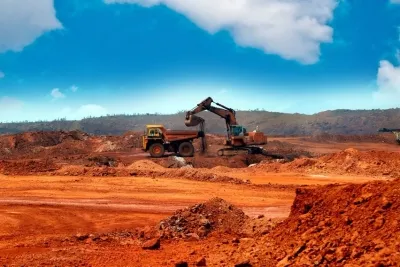Is China Strengthening Its Grip on Africa's Rare Earths?

Synopsis
Key Takeaways
- China's investments in Africa's rare earth sector are driven by its own economic demands.
- Africa holds significant potential as a source of critical minerals.
- Chinese firms dominate the processing and refining stages of rare earths.
- Corruption and labor exploitation are critical concerns.
- Africa's future depends on leveraging its resources for local development.
New Delhi, Oct 12 (NationPress) China is intensifying its grip on the rare earth elements sector by increasing its presence in African nations rich in critical minerals like cobalt, lithium, and nickel. These minerals are essential for the production of batteries, electric vehicles, and renewable energy technologies.
Nonetheless, Chinese investment ventures have garnered criticism for worker exploitation, lack of transparency, and a preference for employing mainly local Chinese labor rather than engaging local workers.
The goal of China's investments is to bolster its geopolitical power and enhance its high-tech manufacturing capabilities.
Utilizing its infrastructure model, China constructs roads and railways to secure long-term mining rights. Finance serves as another powerful tool for Beijing to cement its presence in African nations. Reports indicate that Chinese loans to African governments and state-owned companies have exceeded a staggering $152 billion, with Angola making up nearly 30 percent of this total.
Furthermore, it is estimated that Chinese firms have invested close to $8 billion in mining projects across Africa. The surge in Chinese investments in African rare earth minerals is propelled by both domestic economic demands and global clean energy requirements, ensuring supply for its high-tech industries through direct investments in mines and financing. Africa is emerging as a critical source of raw materials, with nations like Tanzania poised to become major exporters to Chinese processors.
Chinese enterprises are heavily investing in African mines and processing facilities to guarantee a consistent and long-term supply of rare earth elements (REEs) and other essential minerals for modern technology.
Many projects are currently in various stages of development, with several expected to commence production in the near future, significantly boosting the continent's output. Notable projects include those in Namibia, Malawi, Angola, Tanzania, and South Africa.
While Africa's mining production is on the rise, China's dominance remains in the processing and refining phases of the rare earth value chain, controlling a substantial majority of the global supply.
Moreover, Chinese firms have faced accusations of corrupt practices.
A case in point is Namibia, where Xinfeng Investments, a company linked to Chinese interests, is alleged to have obtained its Uis lithium mine through corrupt practices by utilizing permits designated for small-scale miners.
Africa is becoming an increasingly important source of raw, rare earth ores for both China and Western processors. The continent has the potential to leverage these resources for its development; however, challenges such as rising Chinese influence persist in moving up the value chain beyond merely exporting raw materials.









